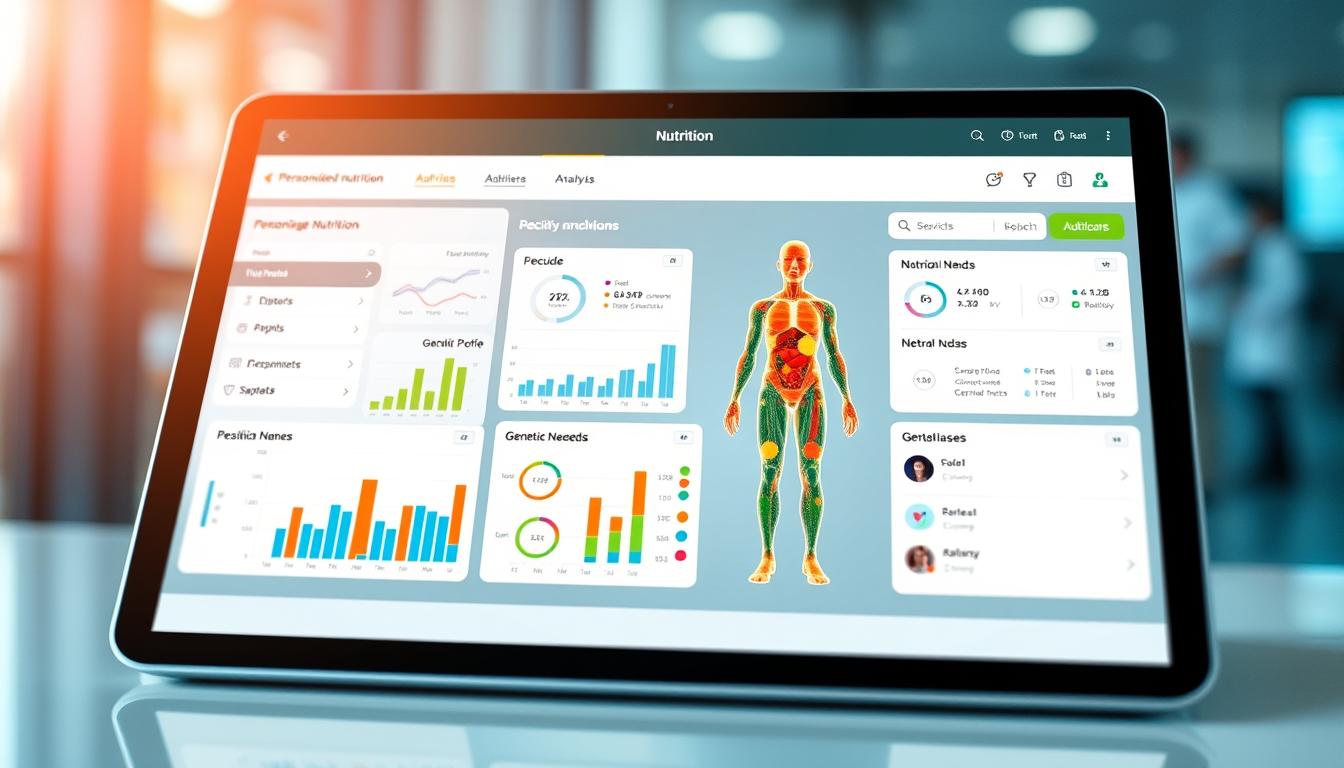Did you know that AI-driven dietary assessments can accurately identify nutritional deficiencies by analyzing dietary intake data? This technology flags specific vitamins, minerals, or macronutrients that are lacking, offering tailored solutions for better health outcomes1.
Traditional diets often follow a one-size-fits-all approach, but advancements in technology are changing the game. By leveraging artificial intelligence and genetic testing, it’s now possible to create customized meal plans that align with individual biological needs2.
These innovations are not just about convenience. They promise to improve metabolic health by optimizing blood sugar control, weight management, and energy levels. Additionally, they can reduce the risk of chronic diseases like diabetes and heart disease by addressing genetic predispositions2.
With tools like continuous glucose monitors and AI-powered meal planning platforms, individuals can receive real-time feedback and make adjustments to their diets. This ensures long-term sustainability and better adherence to health goals1.
Key Takeaways
- AI analyzes dietary data to identify deficiencies and recommend tailored solutions.
- Genetic testing reveals how the body processes nutrients, aiding in customized meal plans.
- Real-time feedback from wearable tech helps optimize dietary choices.
- Personalized approaches can reduce the risk of chronic diseases.
- AI-powered platforms simplify meal planning and tracking for better health outcomes.
Introduction to Personalized Nutrition
Modern nutritional approaches now focus on individual needs and genetic profiles. This shift marks a significant departure from traditional, one-size-fits-all dietary plans. Instead, science-based eating emphasizes tailored solutions that align with unique biological factors3.
Advanced data analysis and technology are reshaping how we understand dietary requirements. By combining genetic insights with nutritional science, experts can now create highly customized meal plans. These plans address specific health goals, such as weight management or chronic disease prevention4.
The principles behind this approach are rooted in precision and innovation. Genetic variations, such as those in the MTHFR gene, can influence how the body processes nutrients. Understanding these variations allows for more accurate dietary recommendations3.
This data-driven method not only improves health outcomes but also enhances adherence to dietary goals. Real-time feedback from wearable devices and AI-powered platforms ensures continuous optimization. As a result, individuals can achieve long-term wellness with greater ease5.
The Shift from One-Size-Fits-All to Customized Diets
For decades, dietary advice followed a universal approach, ignoring individual differences. This one-size-fits-all mentality often failed to address unique health needs, leading to suboptimal results6.
Modern strategies focus on tailored meal plans based on genetic data and lifestyle factors. This shift is revolutionizing how people approach their food choices, ensuring better alignment with personal health goals7.
Genetic testing reveals how the body processes nutrients, enabling precise dietary recommendations. AI-driven insights further enhance this process by analyzing vast amounts of data to predict health implications8.
This approach offers several benefits:
- Improved health outcomes through targeted nutrient intake.
- Better adherence to dietary plans due to personal relevance.
- Reduced risk of chronic diseases by addressing genetic predispositions6.
Real-world examples highlight the impact of this shift. Companies like Viome and DayTwo use advanced analytics to provide customized diet recommendations, improving metabolic health and preventing conditions like diabetes8.
Moving away from generic strategies empowers individuals to take control of their health. By embracing tailored solutions, they can achieve long-term wellness with greater ease and effectiveness7.
How AI is Revolutionizing Dietary Recommendations
Silicon Valley innovations are driving a new era of precision in dietary recommendations. By leveraging advanced algorithms, these tools analyze genetic profiles, lifestyle habits, and real-time health data to provide tailored advice9.
Understanding AI Algorithms in Nutrition
AI algorithms process vast amounts of personal data to identify patterns and predict health outcomes. For example, genetic testing can reveal variations affecting nutrient absorption, metabolism, and disease risk10. This enables precise dietary adjustments tailored to individual needs.
Research shows that these algorithms can optimize meal plans for specific goals, such as weight loss or muscle gain. By considering food preferences and restrictions, they ensure practical and sustainable solutions11.
Real-Time Data Adjustments and AI Insights
Wearable devices continuously log health metrics, allowing AI systems to adjust recommendations dynamically. This real-time feedback ensures that dietary plans remain aligned with evolving health needs9.
For instance, individuals with low vitamin D absorption can receive tailored supplementation based on their genetic profiles. This approach not only improves health outcomes but also enhances adherence to dietary goals10.
| Feature | Benefit |
|---|---|
| Genetic Analysis | Identifies nutrient absorption and metabolism variations. |
| Real-Time Feedback | Adjusts recommendations based on health metrics. |
| Personalized Plans | Aligns with individual goals and preferences. |
Case studies highlight the transformative impact of this technology. Companies like Viome and DayTwo use AI to provide precise dietary guidance, improving metabolic health and preventing chronic conditions11.
As technology advances, the goal is to make these tools more accessible and affordable. This democratization of dietary advice ensures that more people can benefit from personalized, data-backed strategies9.
Incorporating Genetic Testing into Your Diet Plan
Your genes hold valuable insights into how your body processes nutrients. By understanding your genetic profile, you can make informed dietary choices that align with your unique biological needs12.
Genetic testing analyzes specific markers that influence nutrient metabolism. For example, variations in the MTHFR gene can affect how the body processes folate, while other genes may impact fat or carbohydrate metabolism13.
Interpreting Your Genetic Profile
Interpreting genetic data is essential for creating tailored meal plans. Certain genetic markers can indicate lactose intolerance or a predisposition to vitamin deficiencies. This information helps professionals design diets that address specific health concerns12.
Research shows that genetic variations influence how individuals respond to different foods. For instance, some people may benefit from higher omega-3 intake, while others require more iron to combat fatigue14.
| Genetic Marker | Dietary Impact |
|---|---|
| MTHFR Gene | Affects folate metabolism |
| LCT Gene | Influences lactose tolerance |
| FTO Gene | Linked to fat storage and weight management |
By aligning dietary plans with genetic information, individuals can achieve better health outcomes. This approach reduces the risk of chronic diseases and supports long-term wellness13.
Case Studies: Transformative Impacts of Nutrigenomics
Case studies reveal how customized diets can address chronic conditions effectively. These real-life examples demonstrate the power of tailored meal plans in improving health outcomes and managing diseases. By leveraging scientific data, professionals can design diets that align with individual genetic profiles, leading to significant health improvements3.
Real-Life Examples of Success
One notable case involved a patient with a high genetic predisposition for obesity. By analyzing their FTO gene variants, experts recommended a diet rich in whole grains and low in saturated fats. This approach reduced their risk of obesity and improved metabolic health3.
Another example highlights a patient with the MTHFR 677 TT genotype. Tailored folate supplementation lowered their risk of colorectal cancer by 55% compared to those with other genotypes15. These cases underscore the importance of genetic insights in dietary planning.
Scientific Validation
Research from the 1000 Genomes Project supports these findings. Over 3 million single nucleotide variants (SNVs) influence nutrient metabolism, making personalized diets essential for optimal health3. Studies also show that gene-diet interactions can reduce the risk of type 2 diabetes and coronary artery disease4.
For instance, individuals with specific TCF7L2 gene variants benefit from diets low in refined sugars and high in fiber. This tailored approach helps manage blood sugar levels and prevents chronic conditions3.
Impact on Clinical Practices
These success stories are transforming clinical practices. Healthcare providers now integrate genetic testing into dietary recommendations, ensuring more precise and effective interventions. This shift improves patient adherence and long-term health outcomes15.
By combining genetic data with advanced analytics, professionals can predict health risks and design preventive strategies. This approach not only enhances quality of life but also reduces healthcare costs associated with chronic diseases4.
Addressing Chronic Diseases Through Personalized Diets
Chronic diseases are a leading cause of mortality worldwide, but tailored dietary strategies can significantly reduce their impact. Over 50% of all deaths globally are attributed to inflammatory conditions, many of which are linked to lifestyle factors like diet16.
Customized meal plans can address individual risk factors, such as genetic predispositions and lifestyle habits. For example, a person with type 2 diabetes may benefit from a diet low in carbohydrates, while someone with a high genetic risk for obesity might need a plan focused on whole grains and healthy fats17.
Preventative strategies often include dietary changes that promote effective weight management and reduce disease risk. Studies show that prolonged consumption of Western-type diets leads to chronic, low-grade inflammation, which can be mitigated through tailored nutrition16.
Evidence suggests that individualized dietary plans can lower the occurrence of chronic conditions. For instance, a web application that uses personal data like age and height can help prevent cardiovascular problems by offering customized meal recommendations17.
Preventative Strategies for Managing Health Risks
One effective approach is to use genetic testing to identify specific dietary needs. Variations in genes like MTHFR can influence how the body processes nutrients, allowing for more precise dietary adjustments17.
Another strategy involves leveraging real-time health data from wearable devices. These tools can monitor metrics like blood sugar levels, enabling dynamic adjustments to dietary plans to ensure they remain aligned with health goals16.
By combining genetic insights with lifestyle data, professionals can design diets that not only manage existing conditions but also prevent future health risks. This approach has been shown to improve adherence to dietary plans and enhance long-term health outcomes17.
Leveraging AI-Powered Health Apps for Custom Diet Plans
Health apps powered by advanced technology are reshaping how individuals approach their dietary habits. These tools analyze thousands of variables, including genetic markers, sleep patterns, and daily activity levels, to deliver highly tailored meal plans18.
By integrating real-time feedback, these apps continuously refine recommendations to optimize health outcomes. For example, individuals with diabetes can receive meal combinations designed to maintain optimal glucose levels18.
These platforms serve as essential tools for managing dietary needs. They not only provide personalized meal plans but also track progress, ensuring users stay aligned with their health goals19.
Features of Top Nutrition Apps
Leading health apps offer a range of features designed to enhance user experience. These include real-time tracking, personalized recommendations, and integration with wearable devices. For instance, apps like MyFitnessPal and Cronometer now incorporate AI features for customized meal suggestions18.
One standout feature is the ability to analyze sodium intake and cholesterol levels. This helps users manage heart disease risks by providing heart-healthy meal plans based on individual factors18.
Another key functionality is continuous learning. AI systems adapt recommendations based on user feedback, ensuring plans remain relevant and effective19.
Optimizing App Utility for Better Health Outcomes
To maximize the benefits of these tools, users should focus on consistent data input. Accurate information about dietary habits and fitness objectives allows AI algorithms to generate precise recommendations19.
Regular updates and feedback are also crucial. These enable the app to refine its suggestions, ensuring continuous improvement in health outcomes18.
As one expert noted,
“The integration of AI with user data is transforming how we approach dietary planning, making it more proactive and effective.”
| Feature | Benefit |
|---|---|
| Real-Time Tracking | Monitors dietary intake and health metrics continuously. |
| Personalized Recommendations | Tailors meal plans based on individual needs and preferences. |
| Wearable Integration | Syncs with devices for comprehensive health monitoring. |
By leveraging these advanced tools, individuals can achieve better control over their health. These apps not only simplify meal planning but also support long-term wellness through continuous optimization19.
Understanding Nutrigenomics Research and Its Applications
Recent advancements in nutrigenomics are shedding light on how genetic variations influence dietary needs. This field explores the interaction between genes and nutrients, offering insights into how individuals process food differently based on their genetic makeup20.

One key finding is that genetic markers, such as the ADRB2 gene, can affect carbohydrate metabolism, leading to conditions like obesity and type 2 diabetes20. Understanding these variations helps professionals design diets that address specific health concerns effectively.
Key Research Findings in Personalized Nutrition
Studies have shown that the PPARG gene polymorphism can increase insulin sensitivity and protect against metabolic disorders20. This highlights the importance of tailoring diets to individual genetic profiles for better health outcomes.
Population research plays a crucial role in identifying common nutritional needs. For example, a genome-wide association study in the Middle East identified genetic determinants of Vitamin D deficiency, emphasizing the need for region-specific dietary interventions21.
Another study explored the role of long-chain polyunsaturated fatty acids in modulating gene expression related to obesity. Incorporating these nutrients into diets may help address non-communicable diseases21.
| Gene | Impact on Metabolism |
|---|---|
| ADRB2 | Affects carbohydrate metabolism, linked to obesity and diabetes. |
| PPARG | Increases insulin sensitivity, protects against metabolic disorders. |
| MTHFR | Influences folate metabolism, affects disease risk. |
As one researcher noted,
“Nutrigenomics is transforming how we approach dietary planning, making it more precise and effective.”
This approach not only improves health outcomes but also enhances adherence to dietary goals20.
Future research aims to integrate AI and machine learning into nutrigenomics, offering more precise methods for understanding gene-nutrient interactions. This will further refine personalized dietary recommendations21.
Integrating Wearable Technology for Real-Time Nutritional Feedback
Wearable technology is revolutionizing the way individuals monitor their health and dietary habits. These devices provide real-time insights into key health metrics, enabling users to make informed decisions about their nutrient intake and overall wellness22.
By tracking metrics like heart rate variability and caloric burn, wearables offer a comprehensive view of the body’s response to dietary choices. This data is crucial for evaluating the effectiveness of meal plans and making necessary adjustments23.
Smart Devices: Monitoring Your Health Metrics
Smart devices, such as fitness trackers and smartwatches, are equipped with advanced sensors that capture detailed health data. These tools can monitor weight, activity levels, and even sleep patterns, providing a holistic picture of an individual’s health22.
Studies show that using wearable technology can increase adherence to dietary recommendations by 25%. This is because real-time feedback helps users stay on track with their health goals23.
For example, a person aiming to manage their weight can use a wearable device to track caloric intake and expenditure. This information allows for precise adjustments to their diet, ensuring better outcomes over time22.
“Wearable technology bridges the gap between data and action, empowering individuals to take control of their health in real time.”
Continuous monitoring also enables timely dietary adjustments. If a device detects irregular patterns, such as elevated blood sugar levels, it can prompt the user to modify their meal plan immediately23.
| Feature | Benefit |
|---|---|
| Real-Time Tracking | Provides immediate feedback on health metrics. |
| Activity Monitoring | Tracks physical activity to ensure balanced caloric intake. |
| Sleep Analysis | Identifies patterns affecting energy levels and recovery. |
Integrating wearable technology with nutrition apps and AI systems enhances its utility. These platforms analyze the collected data to generate personalized meal plans, ensuring optimal nutrient intake and health outcomes22.
As wearable technology continues to evolve, its role in promoting long-term wellness becomes increasingly significant. By leveraging these tools, individuals can achieve better control over their health and dietary habits23.
Navigating Privacy and Ethical Concerns in Genetic Data
As technology advances, the collection and use of genetic data raise significant privacy and ethical concerns. The integration of DNA analysis into dietary planning has opened new doors for health optimization. However, it also brings challenges related to data security and individual rights24.
Genetic profiles contain highly sensitive information, making them a target for misuse. Ensuring the security of this data is critical to maintaining trust in personalized health solutions. Without proper safeguards, the benefits of innovation could be overshadowed by risks to individual privacy25.
Data Security in Personalized Nutrition
Protecting genetic data requires robust security measures. Encryption, secure storage systems, and strict access controls are essential to prevent unauthorized access. These practices ensure that sensitive information remains confidential and is used only for its intended purpose24.
Regulatory frameworks also play a vital role in safeguarding data. Policies like the General Data Protection Regulation (GDPR) in Europe set standards for data handling and privacy. Such regulations help hold organizations accountable and protect individual rights25.
Despite these measures, challenges persist. Data breaches and cyberattacks remain a significant threat, highlighting the need for continuous improvement in security practices. Organizations must stay vigilant to address emerging risks24.
Balancing Innovation with Individual Rights
Technological advancements offer immense potential for improving health outcomes. However, they must be balanced with respect for individual rights. Transparency in data collection and use is essential to build trust and ensure ethical practices25.
Individuals should have control over their genetic data, including how it is used and shared. Informed consent is a cornerstone of ethical data handling, ensuring that users understand the implications of sharing their information24.
Current debates focus on finding this balance. While innovation drives progress, it must not come at the cost of compromising privacy or autonomy. Ethical considerations should guide the development and implementation of new technologies25.
| Practice | Benefit |
|---|---|
| Encryption | Protects data from unauthorized access. |
| Regulatory Compliance | Ensures adherence to privacy standards. |
| Informed Consent | Empowers individuals to control their data. |
By addressing these concerns, the field can continue to innovate while respecting the rights of individuals. Ethical practices and robust security measures are essential to harness the full potential of genetic data in health optimization24.
Building a Step-by-Step Personalized Nutrition Plan
Creating a tailored dietary strategy begins with understanding your unique health profile. This involves assessing both nutritional needs and genetic predispositions to craft a plan that aligns with your goals26.
Start by evaluating your current dietary habits and health metrics. Tools like wearable devices can track activity levels, sleep patterns, and caloric intake, providing a comprehensive view of your health27.
Assessing Your Nutritional and Genetic Needs
Genetic testing offers insights into how your body processes nutrients. For example, variations in the MTHFR gene can influence folate metabolism, while other markers may affect fat or carbohydrate processing26.
Combining this data with nutritional assessments helps identify deficiencies or sensitivities. AI-powered platforms analyze this information to suggest tailored meal plans27.
Choosing the Right Tools and Services
Selecting the right tools is crucial for effective management. Apps like Noom and PlateJoy use AI to create meal plans based on your preferences and health goals27.
Wearable devices, such as Fitbit and Apple Watch, integrate with these apps to provide real-time feedback. This ensures your plan evolves with your changing health status27.
By leveraging technology, you can build a sustainable relationship between your diet and health management. This approach not only improves outcomes but also makes it easier to stick to your goals26.
Cost, Accessibility, and Ethical Considerations
Affordability and accessibility remain key hurdles in modern dietary planning. While tailored solutions offer significant benefits, their high costs often limit widespread adoption. Genetic testing, specialized apps, and custom meal plans can be expensive, creating barriers for many individuals28.
Economic challenges are compounded by accessibility issues. Rural or underserved communities often lack the infrastructure to support advanced dietary technologies. This disparity highlights the need for cost-effective solutions that ensure equitable care29.

Ethical considerations also play a critical role. Ensuring that innovations benefit all, regardless of socioeconomic status, is a growing concern. Balancing technological advancements with public health demands requires thoughtful strategies25.
One approach is to integrate these solutions into existing healthcare systems. By leveraging public health initiatives, governments can subsidize costs and improve access. This ensures that vulnerable populations receive the care they need28.
Another strategy involves simplifying technologies to reduce costs. For example, AI-driven tools can streamline dietary assessments, making them more affordable. This approach not only lowers expenses but also enhances scalability29.
| Challenge | Solution |
|---|---|
| High Costs | Subsidies and public health integration |
| Accessibility Issues | Simplified, scalable technologies |
| Ethical Concerns | Equitable distribution strategies |
By addressing these challenges, the field can ensure that innovations reach those who need them most. This balance between progress and equity is essential for achieving long-term health improvements25.
Personalized Nutrition: How AI and Genetics Are Transforming Our Diets
The fusion of technology and biology is reshaping dietary strategies. By leveraging genetic datum, modern tools offer precise recommendations tailored to each individual. This approach moves beyond generic advice, focusing on unique biological needs30.
AI-driven insights analyze vast datasets to identify patterns in nutrient metabolism. This allows for highly targeted dietary plans that address specific health goals. For example, algorithms can detect deficiencies and suggest corrective measures31.
Genetic testing plays a pivotal role in this process. Variations in genes like MTHFR influence how the body processes nutrients. Understanding these variations enables more accurate dietary adjustments30.
Real-time feedback from wearable devices further enhances this precision. Continuous monitoring ensures that dietary plans evolve with changing health metrics. This dynamic approach improves adherence and long-term outcomes32.
| Feature | Benefit |
|---|---|
| Genetic Analysis | Identifies nutrient absorption and metabolism variations. |
| Real-Time Feedback | Adjusts recommendations based on health metrics. |
| Personalized Plans | Aligns with individual goals and preferences. |
By combining genetic insights with advanced analytics, professionals can predict health risks and design preventive strategies. This approach not only enhances quality of life but also reduces healthcare costs associated with chronic diseases31.
As technology advances, the goal is to make these tools more accessible and affordable. This democratization of dietary advice ensures that more people can benefit from personalized, data-backed strategies30.
Integrating Traditional Wisdom with Modern Nutritional Science
Traditional dietary wisdom, rooted in centuries of practice, is now being enhanced by cutting-edge technologies. This blend of old and new offers a unique approach to health, combining time-tested practices with modern innovations33.
For thousands of years, cultures like traditional Chinese medicine have recognized the connection between food and health. This concept, known as “medicine-food homology,” is now evolving into a more personalized approach, addressing chronic diseases that are on the rise globally33.
Combining Age-Old Dietary Advice with New Technologies
The shift from generic one-size-fits-all models to tailored strategies highlights the limitations of traditional public health interventions. Modern tools, like AI and genetic testing, are being used to refine these age-old practices34.
For example, foods like ginger and cinnamon have long been used for their therapeutic effects. Now, advanced data analytics can identify how these ingredients interact with individual genetic profiles, optimizing their benefits33.
Research shows that no single diet fits all. Personalized strategies, supported by advances in microbiomics, improve dietary adherence and long-term health outcomes34.
“The integration of traditional wisdom with modern science is transforming how we approach dietary planning, making it more precise and effective.”
This approach emphasizes food interactions, cooking methods, and meal timing, reflecting a holistic view of health. Scientific research is validating these practices, revealing the biochemical mechanisms behind their benefits33.
| Traditional Approach | Modern Enhancement |
|---|---|
| Medicine-food homology | AI-driven personalized plans |
| Herbal remedies | Genetic testing for nutrient metabolism |
| Holistic meal timing | Real-time feedback from wearables |
By blending traditional wisdom with modern science, individuals can take proactive roles in their health. This approach not only improves outcomes but also reduces reliance on pharmaceuticals, offering a sustainable path to wellness33.
Tips for Effective Weight Management and Optimal Health
Achieving optimal health and maintaining a healthy weight requires more than just generic advice. Understanding your genetic makeup and how it interacts with food can unlock the potential for long-term wellness35.
Studies show that tailored dietary strategies based on genetic data lead to better health outcomes. For example, genotype-based advice has been linked to reduced sodium intake and improved dietary patterns36. This highlights the importance of aligning your diet with your unique biology.
Dietary Recommendations for Long-Term Wellness
Start by evaluating your current eating habits and health metrics. Wearable devices can track activity levels, sleep patterns, and caloric intake, providing a comprehensive view of your health35.
Genetic testing can reveal how your body processes nutrients. Variations in genes like MTHFR influence folate metabolism, while others affect fat or carbohydrate processing36. This data helps professionals design meal plans tailored to your needs.
Incorporating these insights into your daily routine can improve adherence to dietary goals. For instance, real-time feedback from apps ensures your plan evolves with your health status35.
“Understanding the relationship between food and your biology is key to achieving sustainable health.”
By leveraging these strategies, you can take control of your health and achieve long-term wellness. This approach not only improves outcomes but also reduces the risk of chronic diseases36.
Conclusion
The future of dietary strategies lies in the seamless integration of advanced technologies and genetic insights. Direct-to-consumer innovations, such as genetic testing and AI-driven platforms, are reshaping how individuals approach their health. These tools analyze vast datasets to provide tailored recommendations, ensuring better alignment with unique biological needs27.
Balancing technology with privacy and ethical considerations remains crucial. Robust security measures and transparent data practices are essential to maintain trust in these innovations37. As the field evolves, continued research will further refine these approaches, making them more accessible and impactful.
By leveraging direct-to-consumer services, individuals can take proactive steps toward long-term wellness. This forward-looking perspective highlights the potential of tailored dietary strategies to transform health outcomes on a global scale38.
FAQ
What is personalized nutrition?
How does AI contribute to dietary recommendations?
What role does genetic testing play in nutrition?
Can personalized nutrition help manage chronic diseases?
Are there privacy concerns with genetic data in nutrition?
How do wearable devices support personalized nutrition?
What are the benefits of combining traditional diets with modern science?
How can I start a personalized nutrition plan?
Are personalized nutrition services accessible to everyone?
What are the key features of top nutrition apps?
Source Links
- AI in Personalized Nutrition and Diet: Transforming the Way You Eat – https://blog.emb.global/role-of-ai-in-personalized-nutrition-and-diet/
- Personalized Nutrition: How AI and Genetic Testing Are Revolutionizing Diets – https://blog.telewellnessmd.com/personalized-nutrition-how-ai-and-genetic-testing-are-revolutionizing-diets
- Personalized Nutrition: Tailoring Dietary Recommendations through Genetic Insights – https://pmc.ncbi.nlm.nih.gov/articles/PMC11357412/
- Applications of Artificial Intelligence, Machine Learning, and Deep Learning in Nutrition: A Systematic Review – https://pmc.ncbi.nlm.nih.gov/articles/PMC11013624/
- Personalized Nutrition: How AI Is Revolutionizing Diet Planning – https://www.linkedin.com/pulse/personalized-nutrition-how-ai-revolutionizing-diet-tanveer-temfc
- Kizen Resources – https://kizen.com/resource-center/resources/ai-in-nutrition-the-future-of-nutritional-advice-and-dietary-habits
- Nutrition Is Moving Beyond ‘One Size Fits All.’ Here’s How Tech Is Personalizing Your Diet – CB Insights Research – https://www.cbinsights.com/research/personalized-nutrition-wellness/
- Unlocking the Future of Nutrition: How AI is Revolutionizing Personalized Diet Plans for Optimal Health – https://www.linkedin.com/pulse/unlocking-future-nutrition-how-ai-revolutionizing-personalized-clrff
- The Rise of Personalized Nutrition: How AI is Revolutionizing Diet Plans in 2024 | CareYaya – https://www.careyaya.org/resources/blog/the-rise-of-personalized-nutrition-how-ai-is-revolutionizing-diet-plans-in-2024
- How AI and Genetic Testing are Shaping Our Diet 2.0 – https://ispwscottsdale.com/how-ai-and-genetic-testing-are-shaping-our-diet/
- The ‘dark matter’ of nutrition: How AI and network science are transforming our understanding of food and health – https://news.northeastern.edu/2025/03/04/ai-nutrition-impact/
- What Is Personalized Nutrition and How It Can Transform Your Health – Health & Wellness Canada – https://www.healthcouncilcanada.ca/what-is-personalized-nutrition-and-how-it-can-transform-your-health/
- Nutrition Plans in 2025: How AI and Genetics Are Transforming Diets HealthcareOnTime – https://www.healthcareontime.com/health-tips/nutrition-plans-in-2025/?srsltid=AfmBOorMXGMHSg8qDcmAFE7DNVlogfmAbpWoZR7oiQR-MceyrRh8GqWy
- Here Come the Artificial Intelligence Nutritionists (Published 2022) – https://www.nytimes.com/2022/03/14/well/eat/ai-diet-personalized.html
- Nutrigenomics and microbiome shaping the future of personalized medicine: a review article – Journal of Genetic Engineering and Biotechnology – https://jgeb.springeropen.com/articles/10.1186/s43141-023-00599-2
- Precision medicine in the era of artificial intelligence: implications in chronic disease management – Journal of Translational Medicine – https://translational-medicine.biomedcentral.com/articles/10.1186/s12967-020-02658-5
- Artificial Intelligence and Machine Learning Technologies for Personalized Nutrition: A Review – https://www.mdpi.com/2227-9709/11/3/62
- How AI-Powered Nutrition Plans Are Transforming Canadian Health Outcomes – Health & Wellness Canada – https://www.healthcouncilcanada.ca/how-ai-powered-nutrition-plans-are-transforming-canadian-health-outcomes/
- The Role of AI in Personalized Nutrition and Fitness Plans – https://www.roarsinc.com/our-journal/the-role-of-ai-in-personalized-nutrition-and-fitness-plans/
- Nutrigenomics: How Your Genes Influence Your Nutritional Needs and Health – https://www.news-medical.net/health/Nutrigenomics-How-Your-Genes-Influence-Your-Nutritional-Needs-and-Health.aspx
- Editorial: Nutrigenomics and personalized nutrition: advancing basic, clinical, and translational research – https://pmc.ncbi.nlm.nih.gov/articles/PMC11211598/
- The Future of Personalized Nutrition in a Tech-Driven World: Innovations and Challenges Ahead – https://www.starleaf.com/blog/the-future-of-personalized-nutrition-in-a-tech-driven-world-innovations-and-challenges-ahead/
- Artificial Intelligence Applications to Measure Food and Nutrient Intakes: Scoping Review – https://pmc.ncbi.nlm.nih.gov/articles/PMC11638690/
- Can artificial intelligence transform public health nutrition? – https://www.news-medical.net/news/20231011/Can-artificial-intelligence-transform-public-health-nutrition.aspx
- Investigation and Assessment of AI’s Role in Nutrition—An Updated Narrative Review of the Evidence – https://pmc.ncbi.nlm.nih.gov/articles/PMC11723148/
- Revolutionizing Health: How AI-Powered Personalized Nutrition Plans Are Changing the Game in… – https://medium.com/@adelstein/revolutionizing-health-how-ai-powered-personalized-nutrition-plans-are-changing-the-game-in-68b266e5956a
- AI in Personalized Nutrition: Comprehensive Overview and Real-World Applications – https://medium.com/@preeti.rana.ai/ai-in-personalized-nutrition-comprehensive-overview-and-real-world-applications-ecad07b7f137
- Nutrition Plans in 2025: How AI and Genetics Are Transforming Diets HealthcareOnTime – https://www.healthcareontime.com/health-tips/nutrition-plans-in-2025/?srsltid=AfmBOoocEt4d9EptENTWOxWSx6T0j5EYYjnRjweaH60bkU2FFs6TUsNm
- Personalised nutrition and health – https://www.bmj.com/content/361/bmj.k2173
- How AI and Machine Learning Are Personalized Nutrition and Diet Plans – https://www.scalacode.com/blog/ai-and-machine-learning-in-personalized-nutrition-and-diet-plans/
- Frontiers | AI-Driven Advances in Personalized Nutrition through Optimization in Food Manufacturing – https://www.frontiersin.org/research-topics/66664/ai-driven-advances-in-personalized-nutrition-through-optimization-in-food-manufacturingundefined
- The Future of Personalized Nutrition: Tailoring Diets with AI and Gut – https://www.capecrystalbrands.com/blogs/cape-crystal-brands/the-future-of-personalized-nutrition-tailoring-diets-with-ai-and-gut-microbiome-analysis?srsltid=AfmBOop_d10HCvfvNPY_O-yyccSfuYz6yhA4i3MqCZQhenJCPSsMQT0m
- Your plate is your medicine cabinet: How ancient wisdom is transforming modern diets – https://studyfinds.org/ancient-wisdom-modern-diets/
- Forgetting how we ate: personalised nutrition and the strategic uses of history – https://pmc.ncbi.nlm.nih.gov/articles/PMC10920492/
- Personalized nutrition: How DNA testing is revolutionizing dietary advice – https://editverse.com/personalized-nutrition-how-dna-testing-is-revolutionizing-dietary-advice/
- Does Personalized Nutrition Advice Improve Dietary Intake in Healthy Adults? A Systematic Review of Randomized Controlled Trials – https://pmc.ncbi.nlm.nih.gov/articles/PMC8166555/
- The Role of Artificial Intelligence in Nutrition Research: A Scoping Review – https://www.mdpi.com/2072-6643/16/13/2066
- Nutrition Plans in 2025: How AI and Genetics Are Transforming Diets HealthcareOnTime – https://www.healthcareontime.com/health-tips/nutrition-plans-in-2025?srsltid=AfmBOor_uXxi9Dh304Jrz1AQrYw2D4x0ZV3LmhmPs7CgbdEj52F7aCh1




